Term Page
Enforcement 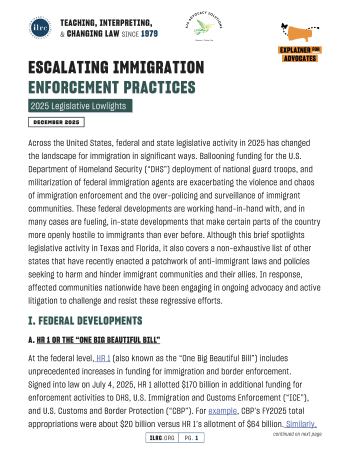
This brief spotlights legislative activity in Texas and Florida, it also covers a non-exhaustive list of other states that have recently enacted a patchwork of anti-immigrant laws and policies seeking to harm and hinder immigrant communities and their allies.
From October 3-7, 2025, Goodwin Simon Strategic Research surveyed a statewide representative sample of 1,213 registered voters. The poll explored voter attitudes towards mass deportation, recent ICE actions, and sanctuary protections in the state. Uniquely, this poll explores key themes that may be driving Californians’ growing disapproval of mass deportation, including revealing voters’ strong support for due process, including for people with past records, and equal treatment in the legal system, regardless of immigration status. Voters also expressed deep concern with the cost of the Trump administration’s approach to immigration on taxpayers.
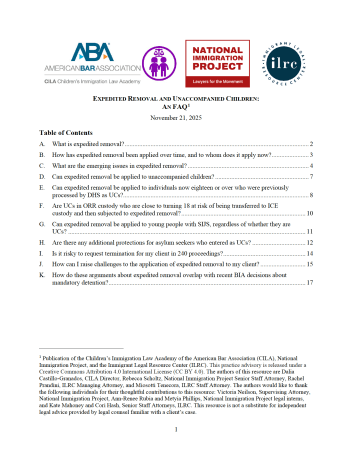
This resource – created with our partners at the Children’s Immigration Law Academy and National Immigration Project – answers common questions about expedited removal and its application to children and offers arguments against its application to young people who were processed as UCs and young people with approved special immigrant juvenile status (SIJS), should the government attempt to apply it to those groups.
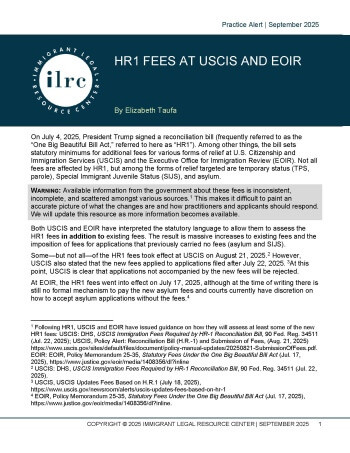
This practice advisory provides information about recently implemented fee increases at USCIS and EOIR. These fee increases are a result of the “One Big Beautiful Bill Act” also known as HR1. This advisory explores what we know and what we still don’t know about the fees, how to pay them, and potential future changes.
On July 28, 2025, the ILRC submitted a comment opposing a new government rule that imposes massive civil fines—sometimes up to nearly $2 million—on immigrants who entered the U.S. without authorization or did not leave after a removal order.
Recently, the Department of Justice (DOJ) published a memo listing out its priorities for civil enforcement cases. In that memo, the DOJ states that it will be focusing on denaturalization cases. This memo - along with statements made by administration officials and members of congress - has sparked a lot of attention on denaturalization and questions about who could be denaturalized. This has caused a lot of fear and uncertainty in communities, but denaturalization is not as straightforward as you might think.
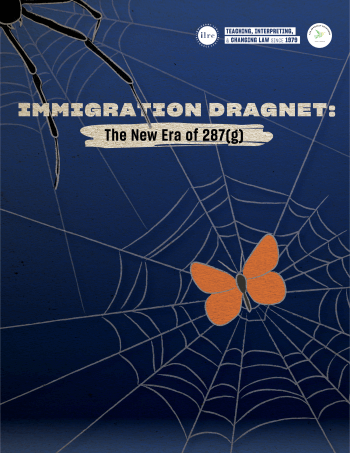
Section 287(g) of the Immigration and Nationality Act (“INA”) authorized the creation of a program that allows state and local law enforcement agencies to act as immigration enforcement agents.This policy brief reviews the recent history of 287(g) agreements and how they’ve proliferated, describes the three 287(g) agreement models, examines a case study of escalating 287(g) programs in Florida, delves into the programs’ dangers and harms, and provides some recommendations for local communities that want to stop 287(g) agreements in their tracks.
A resource highlighting interior enforcement practices within the Harris county region of Houston, Texas.
Community members across the country are reporting visits from immigration and other federal officers seeking to meet with certain children who entered the United States unaccompanied. These children are often referred to as “unaccompanied children” (UCs) because at the time they were arrested by immigration (such as crossing the border), they were not with a parent or legal guardian. Although these visits are sometimes described as “wellness checks,” they are part of a broader, coordinated effort to locate and deport some vulnerable young people and their sponsors. It is crucial for families and immigrant communities to stay informed, exercise their rights, and seek legal support when needed.
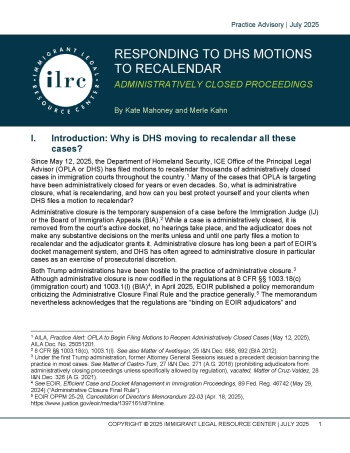
In recent months, the Department of Homeland Security has begun filing thousands of motions to recalendar administratively closed proceedings. This trend is raising questions about how attorneys and accredited representatives can respond to these motions and protect their clients’ interests, particularly in cases that have been administratively closed for many years. This advisory explores those questions and offers strategy considerations when determining how to proceed in each case.